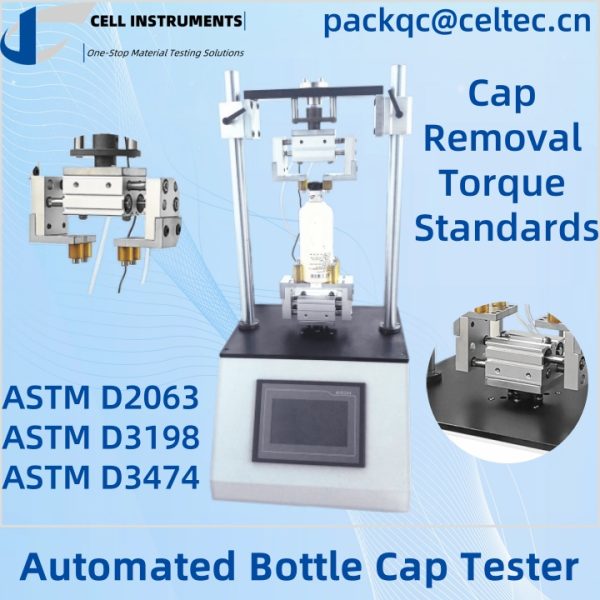Automated Bottle Cap Tester: Ensuring Compliance with Cap Removal Torque Standards
Introduction
In industries such as packaging, pharmaceuticals, beverages, and cosmetics, maintaining the proper torque of bottle caps is crucial. Automated bottle cap testers play a vital role in ensuring caps are neither too tight nor too loose, thereby protecting the integrity of the product inside. This article explores the features, benefits, and applications of automated bottle cap testers, highlighting how they comply with key standards like ASTM D2063, ASTM D3198, and ASTM D3474.
Importance of Automated Bottle Cap Testers in Various Industries
Automated bottle cap testers are indispensable tools in several industries due to their ability to:
- Ensure Quality Assurance: By providing consistent and accurate torque measurements, these testers help maintain product quality and prevent customer complaints.
- Enhance Safety: Properly sealed caps prevent leaks, contamination, and ensure ease of opening.
- Ensure Compliance: Meeting industry standards such as ASTM D2063, ASTM D3198, and ASTM D3474 is crucial for regulatory compliance.
- Improve Efficiency: Automation reduces testing time and minimizes human error.
Key Features of Automated Bottle Cap Testers
Automated bottle cap testers are equipped with advanced features that ensure reliable and precise measurements:
- PLC Controlled Unit: Offers industrial-level stability with an intuitive HMI touch screen interface.
- Auto Clamping and Rotating Capability: Simulates a production line environment, enhancing real-world applicability.
- Measurement of Locking and Opening Forces: Provides comprehensive data on cap performance.
- Automatic Peak Value Retention: Captures the highest torque value for accurate assessment.
- Upper and Lower Dual Pneumatic Clamping Mechanisms: Securely hold various cap sizes and types during testing.
- Automatic Rotation Functionality: Streamlines the testing process, allowing for consistent results.
- Micro Printer: Facilitates effortless data recording for quality control documentation.
- Multiple Units of Measurement: Displays results in Kgf.cm, N.cm, daN.cm, Inch.lbs, and N.m for versatility.
- Overload Protection and Auto-Zeroing Function: Enhances safety and accuracy.
- RS232 Port and Professional Computer Software (Optional): Allows for advanced data analysis and integration with other systems.
Test Methods for Cap Torque Testing
Understanding the test methods for cap torque testing ensures accurate and reliable results:
- Preparation of Samples: Ensure caps and containers are clean and undamaged.
- Setting Up the Cap Torque Tester: Adjust settings according to the specific test requirements.
- Performing the Test: Use the automatic clamping and rotating functions to test the cap.
- Interpreting Results: Analyze the torque measurements to determine if they meet the required standards.
Types of Tests:
- Application Torque Test: Measures the force required to apply the cap.
- Removal Torque Test: Measures the force required to remove the cap.
- Application/Removal Torque Test Cycle: Tests the cap through multiple application and removal cycles to ensure durability.
Compliance with ASTM Standards
Automated bottle cap testers ensure compliance with key industry standards, enhancing the credibility and reliability of the testing process:
ASTM D2063: Defines procedures for measuring the torque retention of continuous thread closures, including steps for sample preparation, testing, and data interpretation.
ASTM D3198: Specifies methods for measuring the application and removal torque of threaded or lug-style closures, outlining precise steps to ensure accurate torque measurement.
ASTM D3474: Offers guidelines for the calibration and proper use of torque meters in packaging applications, describing calibration procedures and best practices for use.
Applications of Automated Bottle Cap Testers
Automated bottle cap testers are used across various industries, including:
- Packaging: Ensures containers are sealed correctly to prevent leaks and contamination.
- Food and Beverages: Maintains product freshness and safety by ensuring proper cap torque.
- Pharmaceuticals: Ensures the integrity and safety of medicinal products.
- Cosmetics: Prevents product spillage and maintains quality.
- Chemical and Household Products: Ensures safety and usability by maintaining proper sealing.
Specific Use Cases:
- Ensuring Child-Resistant Closures: Tests caps for compliance with child safety standards.
- Verifying Tamper-Evident Features: Ensures tamper-evident caps function correctly.
- Quality Control in Production Lines: Integrates testers into production lines for continuous quality monitoring.
Customization Options
To meet specific testing needs, automated bottle cap testers offer customization options such as:
- Tailoring Torque Ranges: Adjusts the tester to suit specific application requirements.
- Tailoring Sample Size Ranges: Modifies the tester to handle various cap sizes.
- Software Integration: Allows for advanced data analysis and reporting.
FAQ
What is the importance of using an automated bottle cap tester?
- Automated bottle cap testers ensure consistent and accurate torque measurements, maintaining product quality and compliance with industry standards.
How do automated bottle cap testers enhance safety?
- By preventing under-tightened caps that could lead to leaks or contamination and over-tightened caps that could be difficult to open.
What are the key standards automated bottle cap testers comply with?
- They comply with ASTM D2063, ASTM D3198, and ASTM D3474 standards, ensuring reliability and accuracy in torque measurements.
Can automated bottle cap testers handle different cap sizes?
- Yes, they feature upper and lower dual pneumatic clamping mechanisms that securely hold various cap sizes and types during testing.
What industries benefit from using automated bottle cap testers?
- Packaging, food and beverages, pharmaceuticals, cosmetics, and chemical and household products industries benefit significantly from these testers.

